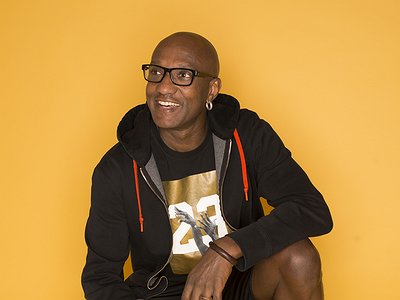Part 3
Could you take us through a day in your life, from a possible morning routine through to your work? Do you have a fixed schedule? How do life and creativity feed back into each other - do you separate them or instead try to make them blend seamlessly?
I wake up in the morning, I don’t have breakfast, just a bit of fruit. I check my emails, I have a quick talk with my team and then I get ready to go running. That’s my main drug, I’m addicted to running. I’m not happy if I don’t run every day, it helps me to think about what I’m going to do in the day, helps me to take decisions. It’s like a meditation, it makes me think and when I get back home I’m ready for anything!
I run nearly every day for an hour and a half to two hours. It’s the same when I’m playing, it’s absolutely essential that I run before, it helps me relax. It also helps me with my creativity, it’s all linked. When I get back home from running I have my lunch and then I lock myself up in the studio, until late.
Let's say you have a gig coming up tonight. What does your approach look like – from selecting the material and preparing for, opening and then building a set?
My approach is quite simple, I never prepare my set beforehand, I don’t make lists. What I do is I listen to a lot of music, house, techno, different stuff, to figure out what I feel like playing. Also I’ll listen to promos that I’ve received and new tracks that I’ve bought. After that, it’s all about the feeling. I arrive in the club, and I feel the atmosphere, how the people are, what’s the vibe, what’s the vibe of the other DJs.
What is true is that I often have a clear idea of what will be the first and last tracks. That’s because the first track has to be catchy, you have to attract people’s attention right from the start, that way they’re more likely to stay with you for the entire ride. After that it all flows.
Can you describe your state of mind during a DJ set? What supports this ideal state of mind and what are distractions? Are there strategies to enter into this state more easily?
To get myself in the right state of mind I go all out running a few hours before the set, and then I’m totally relaxed, I don’t need anything else. Sometimes you get to go out for a meal with the promoters or club owners, and their crew, and that can be super-friendly and fun and put you in the right mood too. And if they take you to a nice little place for good food, even better! I stopped taking drugs more than twenty years ago, but I’m open-minded and I believe everybody has to make their own decision about that. On the other hand, I won’t say no to a nice gin & tonic.
My state of mind during a DJ set is to be positive. People have come to see you, so I think it’s important to share not only music but also a bit of love, a smile, to have a positive interaction. That’s why I really enjoy playing the small venues, where you’re close to the crowd.
What are some of the considerations that go into deciding which track to play next? What makes two tracks a good fit? How far do you tend to plan ahead during a set?
I wouldn’t say that it’s a decision, rather I go with how I feel. I’m quite versatile in my sets, so I can play house, techno, minimal, melodic stuff or vocals, it’s really up to how I feel the crowd.
What I do is that I like to keep the pressure on, I’m attentive to people and I don’t want to let them get bored, not even one minute. Based on their reaction, that’s when I know that it’s time to switch it up, change for something else, to keep them happy. It all happens moment to moment, and that’s why I don’t plan ahead before or during my sets.
Would you say you see DJing as improvisation? As composition in the moment? Or as something entirely different from these terms?
Yes, I totally see DJing as an improvisation, and that’s the beauty of it. No two days are the same. Sometimes what you’re doing just gels, and other days you struggle to keep the public’s attention. Some days are magical and other days not so much. For me DJing is mostly about my interaction with the crowd.
How do playing music at home and presenting it in the club compare and relate? What can be achieved through them, respectively, and what do you personally draw from both?
Of course the big difference between playing at home and in clubs is the reaction of the crowd. In clubs, there will be people who like what you play and others who don’t. Sometimes you listen to stuff at home and you think they’re going to love this, and it just doesn’t work. In the end, the approach to art is individual, everybody decide for themselves and maybe what I like not everybody will like. I’m going to try to share my musical discoveries, and insist on playing them hoping that people will open up to them over time. Satisfying everybody is not easy, but as DJ you try your best. I try to find the right balance between bringing new stuff to people and not imposing on them.
How would you describe the relationship between your choices and goals as a DJ and the expectations, desires and feedback of the audience? How does this relationship manifest itself during a performance and how do you concretely tap into it?
Often what I try to do is first give the audience what they want, and then I can take them where I want to, to share with them beautiful discoveries. I think that if you want the crowd to follow you, it’s best to start by making them happy, and then you can lead them into your world. You can’t force people on the journey, you’ve got to invite them kindly into your universe.
Sometimes tracks that I love can be challenging, and I really want to share them with other people. So if you’re not sure they’re going to like it you’ve got to introduce them softly.
Especially thanks to the storage facilities of digital media, DJ sets could potentially go on forever. Other than closing time, what marks the end of a DJ performance for you? What are the most satisfying conclusions to a set?
I want to see the dancefloor packed until the end, and people smiling, happy. The most rewarding for me is when people tell me “thank you I’ve had a great evening.” When at the end of your set people ask for another two or three tracks, that’s pure happiness. Often, I want to keep going, and I believe many of my colleagues feel the same.
If there’s a DJ playing right after me I try to keep the crowd going, so he can carry on without a problem, but I lower a bit the energy, so he can bring it up.
Art can be a purpose in its own right, but it can also directly feed back into everyday life, take on a social and political role and lead to more engagement. Can you describe your approach to art and being an artist?
Wow this is an interesting question, I’ve not been asked this often but I like it.
I’m not very political, I think I’m more about art for art’s sake, for beauty in itself. Maybe the guys from Detroit are more political, because they have another vision, related to the injustices in their city. I have great respect for people who use art that way. Some artists make music as a response to political problems, to repression and injustice. It’s also a way out for many individuals, and a way to express yourself. I have the impression that right now in Europe the scene is not so much about that, about making political claims. I think it was much stronger at the beginning with the rave movement, but not so much now.







